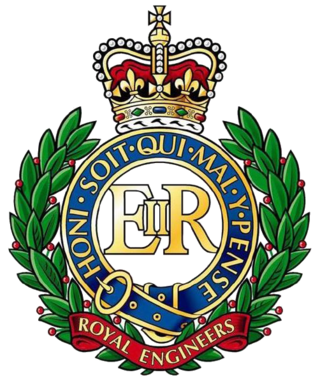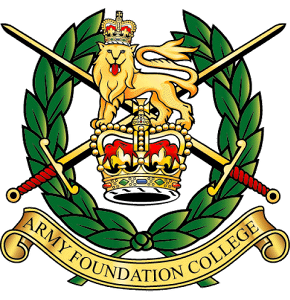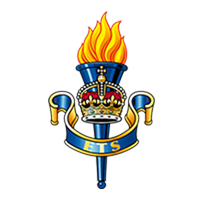
The British Army is the principal land warfare force of the United Kingdom, a part of the British Armed Forces along with the Royal Navy and the Royal Air Force. As of 1 January 2023, the British Army comprises 78,060 regular full-time personnel, 4,060 Gurkhas, 27,570 volunteer reserve personnel, and 4,520 "other personnel", for a total of 114,210.

The Royal Military Police (RMP) is the corps of the British Army responsible for the policing of army service personnel, and for providing a military police presence both in the UK and while service personnel are deployed overseas on operations and exercises. Members of the RMP are often known as 'Redcaps' because of the scarlet covers on their peaked caps and scarlet coloured berets.

The Royal Yeomanry (RY) is the senior reserve light cavalry regiment of the British Army. Equipped with Supacat Jackal variants, their role is to conduct mounted and dismounted formation reconnaissance. The Regimental Headquarters is located in Leicester, with squadrons in Fulham, Nottingham, Dudley, Croydon, Telford, and Leicester. The regiment is part of the Royal Armoured Corps and is only reserve cavalry regiment to resubordinate into regular brigade as part of the Future Soldier Programme, which in turn arose from the Integrated Review of Security, Defence, Development and Foreign Policy published in March 2021.
The rank of airtrooper is a private rank, the first rank awarded to a soldier of the British Army Air Corps.

The Royal School of Military Engineering (RSME) Group provides a wide range of training for the British Army and Defence. This includes; Combat Engineers, Carpenters, Chartered Engineers, Musicians, Band Masters, Sniffer Dogs, Veterinary Technicians, Ammunition Experts, Bomb Disposal Operators, and Counter Chemical Warfare experts, as well as Command and Leadership.

The Sri Lanka Army is the oldest and largest of the Sri Lanka Armed Forces. Established as the Ceylon Army in 1949, it was renamed when Sri Lanka became a republic in 1972. In 2010, the Army had approximately 200,000 regular personnel, between 20,000 and 40,000 reserve (volunteer) personnel and 18,000 National Guardsmen and comprises 13 divisions, one air-mobile brigade, one commando brigade, one special forces brigade, one independent armored brigade, three mechanized infantry brigades and over 40 infantry brigades.
The Army Training Regiments (ATR) provide Basic Phase 1 Training for all elements of the British Army, except the Infantry.
The Infantry Training Centre (ITC) is a unit of the British Army, administered by HQ School of Infantry and responsible for the basic training and advanced training of soldiers and officers joining the infantry. The unit's headquarters are at Catterick, North Yorkshire.
Selection and training in the British Army is the process by which candidates for service are identified, inducted and brought onto the trained strength. The process is the responsibility of the Home Command.

The Army Foundation College (AFC) is located in Harrogate, North Yorkshire, England. It is the only British Army establishment that delivers initial military training to Junior Soldiers.
British Army Reserve Training Locations include four Army Training Unit (ATU) sites and two other locations where the Army Reserve Phase One Training courses are delivered.

Bovington Camp is a British Army military base in Dorset, England. Together with Lulworth Camp it forms part of Bovington Garrison.

The Educational and Training Services form part of the Adjutant General's Corps and have done since 1992 when this Corps of the British Army was formed. Their remit is to continue the general education of soldiers and officers alike, as well as the actual military training of the soldiers of the Army.
Junior Leaders was the name given to some Boys' Service training Regiments of the British Army that took entrants from the age of 15 who would eventually move on to join adult units at the age of seventeen and a half. Their aim was to produce and train the future Non-commissioned officers for their Regiment or Corps.

Prince William of Gloucester Barracks is a military installation near Grantham in Lincolnshire.

The structure of the British Army is being reorganised to the Future Soldier structure. The Army is commanded by the Chief of the General Staff (CGS), with Army Headquarters which is located in Andover, Hampshire. Subordinate to that post, there is a Commander Field Army, and a personnel and UK operations command, Home Command.
Future Soldier is a reform of the British Army resulting from the Integrated Review of Security, Defence, Development and Foreign Policy published in March 2021. The aim of the reform is to create a more lethal, agile and expeditionary force, able to fight and win wars and to operate in the grey-zone between peace and war. Future Soldier was published on 25 November 2021 and deals with the organizational changes of the British Army, with changes to personnel and equipment were set out in the Defence in a Competitive Age paper published on 22 March 2021.
The Army Recruiting and Initial Training Command (ARITC) is a two-star command of the British Army and "is responsible for all recruiting, selection, and basic training of soldiers and the recruitment and selection of officers".








